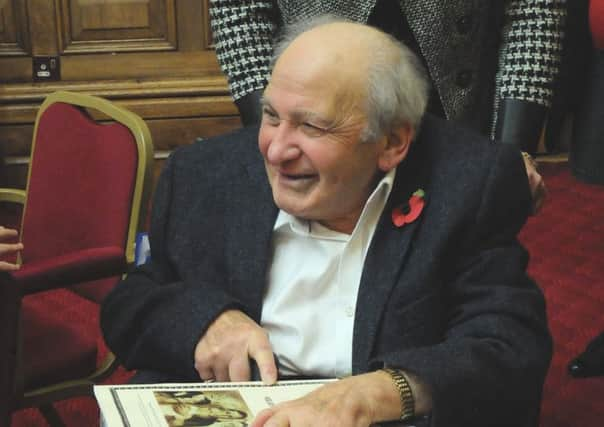Communities affected by genocide come together to share memories


Representatives from the Jewish, Bosnian, Kurdish, Burundian, Hungarian Roma and Ukrainian communities decorated and filled shoe boxes with stories, photographs and other objects to represent the atrocities each of their communities had experienced.
The boxes were exchanged at Dewsbury Town Hall and will be returned on Holocaust Memorial Day, in January, with a piece of art, song, visual presentation or piece of writing inspired by what each group had learned from walking in the others’ shoes.
Advertisement
Hide AdAdvertisement
Hide AdKirklees Council’s community heritage manager, Kim Strickson, said: “The aim of all this was to share experiences and show that the people of Kirklees can work together in spite of world events that threaten to divide them.”
Holocaust survivor Eugene Black, 86, told the room about when he was bundled into a packed cattle truck and taken to Auschwitz.
He said: “More than 100 of us were packed into each wagon. When we arrived three days later women and men, boys and girls, were split up. I had no chance to say goodbye to my family”.
That night in the barracks Mr Black saw the flames coming out of the chimneys, accompanied by a terrible smell. A friend of his father, who survived the initial selection process, told him: “I am sorry to tell you but that is the bodies of our families burning.”
Because of his good health Mr Black was put to work.
Advertisement
Hide AdAdvertisement
Hide Ad“As time went on it got better or at least you got acclimatised to the work,” he said.
Mr Black later found that his sisters Paula and Yolan were not gassed but had been selected for hard labour.
They were killed in an RAF raid on the factory at the concentration camp Buchenwald, in Gelsenkirchen, alongside 150 others, in 1944, when they were denied access to shelter by the SS.
When Mr Black was freed he moved to Britain and worked for 64 years at Marks and Spencer. He advanced from a position as a porter to management.
Advertisement
Hide AdAdvertisement
Hide AdHe said: “God has been good to me. He allowed me to recover and a make a life for myself.”
Dieudonne Manirakiza, who represented the Burundi community in Kirklees and recounted the story of the country’s 1994 genocide, said that racial differences should never lead to violence.
“I was born a Tutsi but I don’t want to identify like that, I want to identify as a human being,” he said.
“I would like to see a world where people live and work together and learn all these stories in a peaceful world.”
Advertisement
Hide AdAdvertisement
Hide AdSenad Kovacevic, who survived the Bosnian war, said that when the conflict began former friends treated him differently because of his name.
He ended up fighting on the side of Serbian army in the conflict and was thrown into a concentration camp after twice trying to escape.
Halwest Karim presented the account of Syrian Kurdish refugee Sleman Shwaish and Fatima, who survived the Halabja chemical attack in 1988.
Annamanna Orsos, who represented the Hungarian Roma community, told the story of Ilona Nagy who survived imprisonment in Auschwitz during the second world war.
Advertisement
Hide AdAdvertisement
Hide AdAnd Mik Semenczuk, told the story of the Holodomor genocide, in which around 4m Ukrainians were systematically starved to death.
Coun Peter O’Neill, Kirklees Cabinet member for communities and leisure, said: “At a time when innocent people are suffering and dying as a result of armed conflicts and terrorism across the world, it is more important than ever that dialogue remains open at home and that we do not confuse faith or race with the actions of particular governments or organisations.”
The project will conclude at Dewsbury Town Hall’s Holocaust Memorial Day event on January 15.